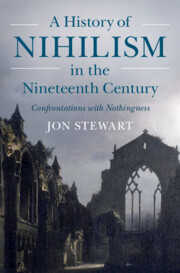
- Publisher:
- Cambridge University Press
- Online publication date:
- March 2023
- Print publication year:
- 2023
- Online ISBN:
- 9781009266734
Our systems are now restored following recent technical disruption, and we’re working hard to catch up on publishing. We apologise for the inconvenience caused. Find out more: https://www.cambridge.org/universitypress/about-us/news-and-blogs/cambridge-university-press-publishing-update-following-technical-disruption

Nihilism – the belief that life is meaningless – is frequently associated with twentieth-century movements such as existentialism, postmodernism and Dadaism, and thought to result from the shocking experiences of the two World Wars and the Holocaust. In his rich and expansive new book, Jon Stewart shows that nihilism's beginnings in fact go back much further to the first half of the nineteenth century. He argues that the true origin of modern nihilism was the rapid development of Enlightenment science, which established a secular worldview. This radically diminished the importance of human beings so that, in the vastness of space and time, individuals now seemed completely insignificant within the universe. The author's panoramic exploration of how nihilism developed – not only in philosophy, but also in religion, poetry and literature – shows what an urgent topic it was for thinkers of all kinds, and how it has continued powerfully to shape intellectual debates ever since.
‘Jon Stewart's A History of Nihilism in the Nineteenth Century presents a remarkable new interpretation of the development of thinking about the problem of the meaninglessness of the human condition that is referred to as nihilism. This concept is usually associated with twentieth-century existentialism, but Stewart traces how the crisis of meaning arose far earlier, namely as a result of the development of Enlightenment science which undermined traditional religious belief. Insight after insight is gained into the different dimensions of nihilism by means of close readings of key thinkers and writers of the nineteenth century. In experiencing the amazing amplitude of scope of the source-critical work and the creative interpretive turns that come as the narrative unfolds, one senses being in the presence of an author of significant humanity and erudition.'
Curtis L. Thompson - Thiel College
‘A History of Nihilism in the Nineteenth Century delivers a comprehensive, balanced survey of the leading philosophical and literary attempts to grapple with the concept of nothingness. Stewart's erudition is on full display as he sheds new light on well-known theorists of nihilism, e.g., Schopenhauer, Nietzsche, and Turgenev, while elevating the contributions of neglected figures, e.g., Klingemann, Büchner, and Møller. Students and scholars alike will appreciate Stewart's clear, engaging, and jargon-free exposition of one of the defining ideas of the nineteenth century. An impressive achievement by any measure.'
Daniel Conway - Texas A&M University
‘While other histories of nihilism focus primarily on one or another of these problems, Stewart's work is unique in that it comes to terms with nihilism as a complex set of problems and thereby offers a comprehensive approach to the topic. By introducing new readers to the multiplicity of the concept, Stewart offers a fresh account that is at once a conceptual study of nihilism's myriad problems, a genealogy of its modern origins, and a comparative analysis of its figures. Readers come away from the book having been introduced to the issues and proposed solutions of nihilism as well as to the interdisciplinary trajectory of philosophical, religious, and literary engagements.’
Nahum Brown - The Philosophical Quarterley
 Loading metrics...
Loading metrics...
* Views captured on Cambridge Core between #date#. This data will be updated every 24 hours.
Usage data cannot currently be displayed.